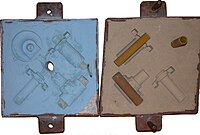
Photo from wikipedia
Abstract Ti-6Al-4V alloys mad by additive manufacturing (AM) with slower cooling rate (e. g., direct energy deposition (DED)) generally have the problem of severe coarsening of α phase. This study… Click to show full abstract
Abstract Ti-6Al-4V alloys mad by additive manufacturing (AM) with slower cooling rate (e. g., direct energy deposition (DED)) generally have the problem of severe coarsening of α phase. This study presents a method to refine the microstructure of the primary β phase formed during the solid–liquid transformation, microstructures formed during the β → α + β transformation, and recrystallized microstructures formed during the repeated heating cycles encountered in AM processes. This is accomplished by the in situ precipitation of nano-sized dispersed high-melting-point yttria Y2O3 particles. The addition of micron-sized particles with high melting points can refine primary crystallized grains and transformed grains corresponding to the secondary phase in Ti-6Al-4V alloys. In addition, they can effectively inhibit the recrystallization and growth of prior-deposited metal grains. The microstructural and tensile properties of laser additive manufactured with filler wire Ti-6Al-4V components with different amounts of Y2O3 (0, 0.12, and 0.22 wt%) were investigated. The refining effect of Y2O3 was significant and the tensile strength of Ti-6Al-4V containing 0.22 wt% Y2O3 in the longitudinal and transverse directions was greater than that of Ti-6Al-4V by approximately 12% and 9%, respectively. Concurrently, there was no loss in the elongation of the material in either direction. The strategy of using micron-sized refractory particles to control phase transformation (primary crystallization, solid-state phase transformation, and recrystallization) can be applied to the AM of different metals, in which microstructures are susceptible to coarsening.
Journal Title: Additive manufacturing
Year Published: 2021
Link to full text (if available)
Share on Social Media: Sign Up to like & get
recommendations!